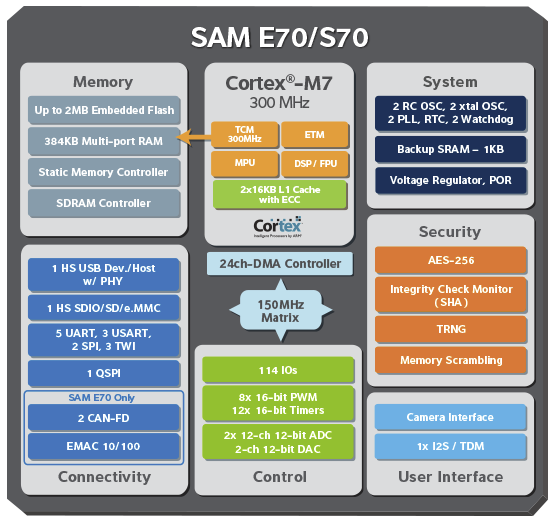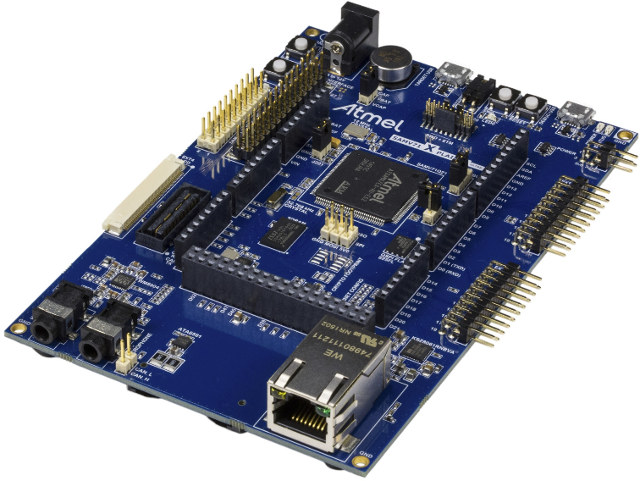ARM Introduced Cortex M7 IP in September, and ST Micro simultaneously announced its STM32F7 Cortex M7 MCU clocked up to 200 MHz, and boards are now available, including some running Linux. But two other companies have licenses Cortex M7, Freescale with its Kinetis KV5x micro-controllers which are yet to be mass-produced, and Atmel which has recently announced their SAM S70 and E70 micro-controllers are now in mass production.
 SAM E70 and S70 have similar features, but E70 offers some extra interface like CAN and Fast Ethernet:
SAM E70 and S70 have similar features, but E70 offers some extra interface like CAN and Fast Ethernet:
- ARM Cortex-M7 core running at up to 300MHz (1500 CoreMark)
- Up to 2MB Flash and 384kByte SRAM
- Floating point unit (FPU) for high-precision computing and accelerated data processing
- High-performance internal memory architecture with user configurable Tightly Couples Memories and System memory, and 16kB I and D-cache
- High Speed USB Host and Device with on-chip high-speed PHY
- CMOS image sensor interface
- AES hardware encryption engines, TRNG and SHA-based memory integrity checker
- Advanced analog front end based on dual 2Msps 12-bit ADCs, including 16-bit average, up to 24 channels, offset error correction and gain control
- Dual 2Msps, 12-bit DAC and analog comparator
- Other I/Os – SSC supporting TDM and I2S, up to 8 UARTs, up to 5 SPI and up to 3 I2C
- 64 to 144-pin package options
- Extended industrial temperature range: -40°C to 105°C
- SAM E70 only:
- Dual Bosch CAN-FD controller
- 10/100 Ethernet MAC with IEEE1588
SAM E70 MCUs are also pin-to-pin compatible with SAM4E series. Atnel claims their new MCUs are 2.5 times faster than their Cortex M4 MCUs, and 50% than competitor “S” (That would be ST Micro), which is expected since STM32F7 are clocked at 200 MHz, while SAM S70/E70 MCUs go up to 300 MHz.
Atmel actually has four families of Cortex M7 MCUs, but their automotive grade V70 and V71 MCUs are not mass-produced yet.
 However since S70, E70, and V70 are all subset of SAM V71, the development platform “SAM V71 Xplained Ultra Evaluation Kit” (Codename: ATSAMV71-XULT) is powered by the top of the line ATSAMV71Q21 micro-controller with 2MB flash, 384KB SRAM and all peripherals available on Cortex M7 microcontrollers.
However since S70, E70, and V70 are all subset of SAM V71, the development platform “SAM V71 Xplained Ultra Evaluation Kit” (Codename: ATSAMV71-XULT) is powered by the top of the line ATSAMV71Q21 micro-controller with 2MB flash, 384KB SRAM and all peripherals available on Cortex M7 microcontrollers.
 SAM V71 Xplained Ultra key features and specifications
SAM V71 Xplained Ultra key features and specifications
- MCU – ATSAMV71Q21 microcontroller
- Memory – 2 MB SDRAM
- Storage – 2 MB QSPI Flash + SD Card connector with SDIO support + AT24MAC402 256KB EEPROM with EUI-48 address
- Connectivity – IEEE 802.3az 10Base-T/100Base-TX Ethernet RMII PHY
- Audio – Stereo audio codec, external PLL for precise clock generation, microphone & headphone jacks
- Camera – Camera interface connector
- USB – USB interface, device and host mode
- CAN – ATA6561 CAN Transceiver
- Media Local Bus (MediaLB) Connector
- Expansion Headers
- 2x Xplained Pro extension headers
- 1x Xplained Pro LCD header
- Arduino due compatible shield connectors
- Debugging – Coresight 20 connector for 4-bit ETM, External debugger connector, Embedded Debugger
- Misc – Reset button, power switch button, mechanical user push-buttons, 2x yellow user LEDs
- Power Supply – 5V via USB or external power input (5-14V)
Software development tools include Atmel Studio, the ARM Keil MDK-ARM and IAR Embedded Workbench, and the MCUs and board support various real-time operating system such as Express Logic ThreadX, FreeRTOS, Keil RTX, NuttX and Segger embOS. Charbax interviewed Atmel a little ago while they were showcasing the Cortex M7 Xplained board at Embedded World.
Atmel SAM S70 MCU starts at $5.34 in 64-pin LQFP package and 512KB on-chip flash for 10k orders, and Atmel SAM V71 Xplained board goes for $136.25. More information is available on SAM S70 and SAM E70 product pages.
Thanks to Nanik for the tip.

Jean-Luc started CNX Software in 2010 as a part-time endeavor, before quitting his job as a software engineering manager, and starting to write daily news, and reviews full time later in 2011.
Support CNX Software! Donate via cryptocurrencies, become a Patron on Patreon, or purchase goods on Amazon or Aliexpress




